Justin Wylie, Va Piano Vineyards
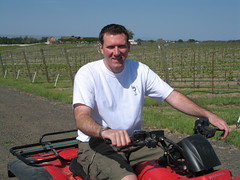 Down the road from Pepperbridge, past an orchard of apple trees strapped to trellises is Va Piano Vineyards, where Jean-Francois Pellet has sent me to talk to his good friend Justin Wylie. I turn into the drive that runs between the newly leafy rows and here comes one of those ATV things, bright red, with a fit of dust trailing. "Park your car, and hop on, I'll take you for a tour," Justin says. I'm wondering how I'm supposed to hoist my butt on this little ride, but somehow I can just fit behind him and brace myself on the rack. Off we go.
Down the road from Pepperbridge, past an orchard of apple trees strapped to trellises is Va Piano Vineyards, where Jean-Francois Pellet has sent me to talk to his good friend Justin Wylie. I turn into the drive that runs between the newly leafy rows and here comes one of those ATV things, bright red, with a fit of dust trailing. "Park your car, and hop on, I'll take you for a tour," Justin says. I'm wondering how I'm supposed to hoist my butt on this little ride, but somehow I can just fit behind him and brace myself on the rack. Off we go.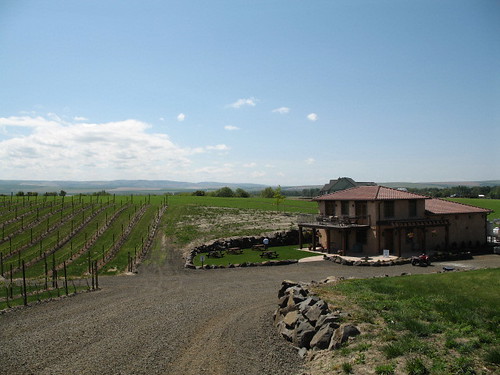 It's a stunning day, baby blue sky, long rolling hills; the closest of which belong to Justin and his family. Justin is eager to tell me everything there is to know about his land. He reminds me of a kid with that "I made this!" enthusiasm.
It's a stunning day, baby blue sky, long rolling hills; the closest of which belong to Justin and his family. Justin is eager to tell me everything there is to know about his land. He reminds me of a kid with that "I made this!" enthusiasm.What he's made is impressive, not because it's a large property with a gorgeous Tuscan Villa in the middle of it, but what's going on inside. Justin hasn't just built a winery for himself, but for other able investors who want to get started as well.
Again, the kid thing: remember when you drew your dream house in Math class, and how it was really big and cool, and you had all your friends living there, hanging out, and there was a game room, and cool stuff on the walls? It's like that, but for winemakers.
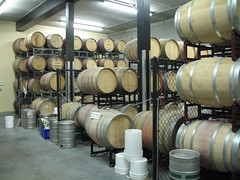 Justin has built himself a sort of co-op. The ample cellar below the tasting room houses the barrels of five other aspiring winemakers, some of whom seemed to have left big careers to do this wine thing: a former CNN producer, an ex-lawyer, a Master Sommelier. While Justin blended barrel samples in the glass for me, I watched as a couple of these guys bustled about, taking their own samples for analysis or sealing bottles with wax guns. The resident grey cellar cat supervises from a perch atop a stack of cases.
Justin has built himself a sort of co-op. The ample cellar below the tasting room houses the barrels of five other aspiring winemakers, some of whom seemed to have left big careers to do this wine thing: a former CNN producer, an ex-lawyer, a Master Sommelier. While Justin blended barrel samples in the glass for me, I watched as a couple of these guys bustled about, taking their own samples for analysis or sealing bottles with wax guns. The resident grey cellar cat supervises from a perch atop a stack of cases.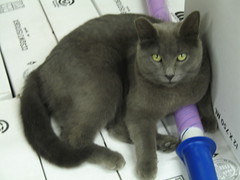 Above in the tasting room, unframed canvases line the wall, each a scene of Italian landscape rendered in vivid colors. My inner art hound craved one, but the price tag was too high. The pieces are done by Fr. Bruno Segatta who was once the Dean at Gonzaga University in Spokane. Justin tells me that Fr. Segatta donates part of the proceeds of the sale of these paintings to an orphanage in Nairobi. There are a couple of them so fetching that I'd buy 'em even if the money went to the NRA, but I just didn't have a grand on me right then.
Above in the tasting room, unframed canvases line the wall, each a scene of Italian landscape rendered in vivid colors. My inner art hound craved one, but the price tag was too high. The pieces are done by Fr. Bruno Segatta who was once the Dean at Gonzaga University in Spokane. Justin tells me that Fr. Segatta donates part of the proceeds of the sale of these paintings to an orphanage in Nairobi. There are a couple of them so fetching that I'd buy 'em even if the money went to the NRA, but I just didn't have a grand on me right then.The wines I tried were intensely colored Syrahs, Cabs and blends, all with bold chocolate or liqueur flavors well-balanced with acid structure. Big but not pumped up; the Walla Walla style. Still too heavy for me, but I'm learning a lot about what makes the Wallans tick, and it's interesting. More on that later...
Interview with Justin Wylie, Va Piano Vineyards
You. Wine. How it came to be. Go.
I lived in Florence, Italy in 1995, '96. And from that point, when I came back to Walla Walla...I wanted to buy a piece of land, and have that land for the future, to build a home on. But at the time I didn't know how I'd pay for the land. Everyone around me was growing grapes, so I thought, why not plant a few grapes. At the same time, I'd started making home wine, so I kinda had an idea of what I wanted to do. But I knew to take the approach that the vineyards were the most important, I wanted to learn about the vineyards. Simultaneously I could learn about the wine processing portion of it. I helped everyone I could with crush at the wineries, and I started making wine in my garage. Once I identified the vineyards that I enjoyed, I went out and purchased one acre of grapes from these different vineyards, and I sold off all the fruit but kept a half ton for myself. I worked with those half ton lots for five years. I tried different barrel programs, different fermentation styles, until I had it figured out, this is where I want to go. So then from that point I spent time at UC Davis taking chemistry and sensory evaluation, started a wine group with my friends. We had wine tasting class every Monday night. All my friends were established winemakers, so if I had any questions, I could go and say, here's a scenario, what would you do. And we still do it, we all do it, among all of our friends. We're always bouncing off ideas about different blends or different wines. So that really helped shave some years off the learning curve.
What do you look for in a glass of wine?
My wines, I want to make sure that they're representative of the terroir...I want to make sure they're fruit forward wines that are really well balanced in relation to alcohol. Alcohol is a big thing, I don't want super, overly ripe, over the top ripe fruit and loads of alcohol. So I really try to keep the alcohol in check. And I can do that because I own my own vineyards, I can harvest at different times, I can blend. I try to keep the Cabernets in the 13.5% range, and the Syrahs no more than 14.3%.
Besides your own wine, what do you put on your table?
I enjoy Syrahs...
Any particular style?
No, we drink something different almost every night. We went down to Paso Robles a couple of months ago...for example.
Tell me about this building.
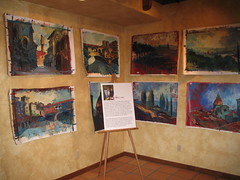 Everything here is authentic. It's a 7500 square foot building. We had an architect design it. The windows are all hand made, the doors are all hand made, and given that aged look. We've really tried to capture a sense of quality, and more important, a time period. It gives the allusion that it's been here for a long, long time.
Everything here is authentic. It's a 7500 square foot building. We had an architect design it. The windows are all hand made, the doors are all hand made, and given that aged look. We've really tried to capture a sense of quality, and more important, a time period. It gives the allusion that it's been here for a long, long time.Your original trade was in granite.
Yes. Hence all the granite around here.
How long were you in that?
Fourth generation. My grandfather started in 1912. So we've been in it a long time.
I've been asking all the winemakers about the hot topic of terroir.
I've been reading all those topics, too. I think terroir comes down to just the flavor profiles in the fruit. It is what it is. You aren't going to change it. The vineyard sites are going to produce what they're going to produce. The Walla Walla has so many different regions within the valley. That really, truly, terroir differs...and the wines are completely different. But I think that through vineyard management you can express those vineyards to their full potential. So I think terroir comes down to...I think it comes down to soil profiles. And management styles, to help bring out the best fruit you possibly can.
******
Now y'all know me, so it's no stretch that I'd be a sucker for a winemaker in a Black Flag tee shirt. But how's about one who actually makes fantastic syrah? Aw yeah, you know it: Charles Smith of K Vintners up next for the people.
Clinkies.
Clinkies.

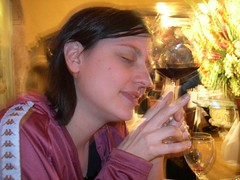



2 Comments:
Just a correction re: my GOOD friend Fr. Bruno Segatta. He is not a member of the Jesuit Order. He is a secular priest under the Boise Diocese. Given the Jesuits issues in the news at this time, it might be wise to change your text to reflect Bruno's true association.
The post has been corrected. Thanks, anonymous.
Post a Comment
<< Home